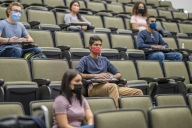You have /5 articles left.
Sign up for a free account or log in.

Skin of a patient infected for three days
CDC
A measles outbreak in the United States -- largely tied to exposure at Disneyland -- is causing alarm across the United States, and at least four colleges have students with the disease.
Measles can be a very serious disease, and has been thought to be largely eradicated in the United States. But the recent outbreak points to the potential for such a disease to spread, especially since the growing antivaccination movement means that some people lack protection against the disease. Contagious diseases always cause worry on college campuses, where students are in very close physical proximity in classes and, for residential campuses, in dormitories.
"This is absolutely a concern for campuses," Sarah Van Orman, executive director of University Health Services at the University of Wisconsin at Madison and president of the American College Health Association, said via e-mail. The association sent an alert to members last week urging campuses to prepare for the possible spread of measles. The latest briefing from the U.S. Centers for Disease Control and Prevention may be found here.
Van Orman said there are two "critical actions" colleges should be taking right now. They should be "reviewing the immunization status of their students and when possible contacting students who are not fully immunized to encourage them to complete this," she said. Further, colleges should be "reviewing and updating their general communicable disease emergency response plans with attention to measles."
She noted that the American College Health Association has expressed concern about the potential danger caused by those who decline to get their children vaccinated. A statement that the association adopted in 2014 states that colleges that require students to be vaccinated should enforce those rules and have a high bar for exemptions.
"Immunizations offer safe and effective protection from vaccine-preventable diseases. The United States is experiencing reemergence of these diseases, in part due to factors such as unimmunized and underimmunized persons and global travel," the statement says. "The American College Health Association strongly supports the use of vaccines to protect the health of our individual students and our campus communities. In recognition of the vital role that vaccine coverage plays in community immunity (herd immunity), ACHA discourages nonmedical exemptions to required vaccines. Best practices for institutions of higher education include... encouraging students who request nonmedical waivers to be counseled by a health service clinician, and considering exclusion of unimmunized students from school during outbreaks of vaccine-preventable diseases."
Here is information on four college cases:
- Moorpark College, in California, sent out 13,000 notices Friday about potential exposure to a student who was present on campus Monday and Tuesday with measles-like symptoms, The Ventura County Star reported.
- California State University at Channel Islands reported that one of its students contracted measles. The university is providing information on places the students was on campus and may have come into contact with others, KEYT News reported.
- A student at Bard College has measles, causing concern off campus because he recently traveled on a train where others may have been exposed, The Poughkeepsie Journal reported.
- A student at the University of Minnesota-Twin Cities has measles, and officials believe that he picked up the disease while abroad, and that it is not related to the California outbreak. The university is reaching out to those who may have come into contact with the student, The Star Tribune reported.








